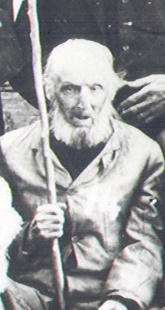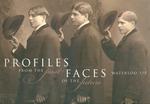Benjamin Burkholder
Imagine a world where teachers were paid a $171.44 annual
salary and had to do farm work in the summer months to
supplement their income. Imagine teaching a class where
students ranged from very young children to adults in their
early twenties.
Such was the career of one of Waterloo’s best-remembered
pioneer teachers. Benjamin Burkholder was notable as the
teacher who made the transition from the 1820 log school
house to the “new” stone school built in 1842.
It is no wonder that after a teaching career that began in 1841
and spanned more than thirty years, Burkholder applied to the
Ontario Superannuated Public School Teachers’ Fund in 1875
writing that he was “disabled and worn out while in the work of teaching and unable to
teach a school any longer.”
Burkholder, who was born in Lancaster County, Pennsylvania on March 26, 1814, was
remembered as a “prominent and successful Common School teacher” and a “most
faithful and energetic teacher.”
The four-acre piece of land on which the stone school house was built where Burkholder
began his career, was donated by Abraham Erb. Erb also set aside money to provide
books for poor children. He stipulated that the land could be used for a school house,
meeting house or grave yard and all future proceeds from the land must be used on behalf
of needy students.
The old log school house was moved to the Greenbush area, near the present-day
Kitchener Collegiate Institute, where a “one-legged slave” rented it as his family’s home
for many years. In 1894 it was moved to Waterloo Park where it still stands.
Shortly after the new stone school was built the Common School Act was passed that
divided the area into school districts, provided for elected school trustees, the building of
new schools, and teacher salaries. The act also spelled out that teachers had to pass an
examination and receive a license to teach.
Burkholder was among the first to receive a teaching certificate after being tested in 1843
by a commission that included a doctor, an Anglican clergyman and three other men.
Burkholder would have been tested in “reading, spelling, writing, arithmetic, a little
grammar and geography.”
It is written that one teacher from Berlin, walked out of the Board of School
Commissioners after “remarking quite audibly” that he would not be examined “by a set
of farmers.”
There is an historical account by a former student who recalled that Burkholder was a
“rather peculiar but not a bad teacher.” The student recalled that he used “a Solar System
apparatus in teaching astronomy.”
While Burkholder is honoured for his years as a teacher, he was also a newspaperman for
two years previously. He published a German weekly called the Morgenstern between
1839 and 1841. Burkholder ran the newspaper out of an office at his father’s farm about
one mile north of the Village of Waterloo.
Photo courtesy of Waterloo Public Library
Benjamin Burkholder (Waterloo 150 Profile)
Description
- Creator
- Gallagher, Beth, Author
- Media Type
- Text
- Image
- Description
- To celebrate Waterloo's 150th anniversary, the Waterloo Public Library published a book called "Profiles from the Past, Faces of the Future." This book featured 150 profiles of people who helped make Waterloo what it is today. This is the digitized profile for Benjamin Burkholder.
- Notes
- Please visit the Waterloo Public Library to enquire about physical copies of "Profiles from the Past, Faces of the Future."
The Waterloo 150 project was funded by a grant from the Waterloo Regional Heritage Foundation. Beth Gallagher wrote the profiles with the assistance of many research volunteers. Information for the profiles was gathered from a variety of sources from the community and the Ellis Little Local History Room. Notable sources include the Ellis Little Papers, newspaper clippings, local magazines and books. - Place of Publication
- Waterloo, Ontario
- Date of Publication
- 2007
- Subject(s)
- Personal Name(s)
- Burkholder, Benjamin
- Language of Item
- English
- Geographic Coverage
-
-
Ontario, Canada
Latitude: 43.4668 Longitude: -80.51639
-
- Copyright Statement
- Uses other than research or private study require the permission of the rightsholder(s). Responsibility for obtaining permissions and for any use rests exclusively with the user.
- Contact
- Waterloo Public LibraryEmail:askus@wpl.ca
Website:
Agency street/mail address:35 Albert Street, Waterloo, Ontario, Canada, N2L 5E2
- Full Text




